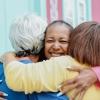Blog
Our blog covers a wide range of topics to help support, inspire, and inform members of our community, including those who have been personally impacted by cancer. Use the search filters below to find blog posts on topics that are important to you, from wellness tips, advocacy & policy news, and cancer research findings to stories and insights shared by patients, survivors, and caregivers.

Men Open Up About Cancer Support: Part 3
Jerry talks about his experience as a caregiver and the value of finding moments for self-care.

Men Open Up About Cancer Support: Part 2
Jonathan talks about his experience navigating cancer and the value of honoring your personal experience.

Men Open Up About Cancer Support & Mental Wellness
Follow our 3-part blog series to hear men's insights on cancer support and what has helped them personally.

Support for LGBTQ+ Cancer Survivors
Discover CSC and Gilda's Club network partners that offer support programming for cancer survivors in the LGBTQ community.

From Student to Survivor: Navigating Life After a Rare Cancer Diagnosis
Abigail, a young survivor, reflects on the ways her cancer experience has changed her perspective on life.

Thinking About CAR T? Read This Survivor's Inspiring Story.
For people with certain blood cancers, CAR T cell therapy can offer hope after prior treatments fail, as this uplifting story tells.

5 Ways to Support Cancer Survivors
Looking for the perfect way to show cancer survivors you care? Here are 5 ways to show your support.

How to Care for Your Pet When You Have Cancer
Coping with cancer while juggling pet care at home? These resources and tips can help.

How Support Groups Can Help After a Cancer Diagnosis
Support groups can offer connection and understanding. Is joining a group right for you?

Check Your Skin Cancer & Sun Safety Knowledge With This Derm Expert
Get answers to common questions about skin cancer, prevention, and protection.